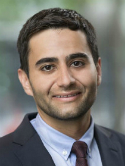Real-world outcomes of neoadjuvant chemoimmunotherapy in patients with nonsmall cell lung cancer: Predictors of surgery, pathologic complete response, and event-free survival Journal Article
| Authors: | Cooper, A. J.; Garbo, E.; Arfe, A.; Conroy, M.; Shaverdian, N.; Bott, M.; Gorria, T.; Pecci, F.; Aldea, M.; Anagnostou, V.; Schoenfeld, A.; Gomez, D.; Forde, P. M.; Awad, M. M.; Jones, D. R.; Ricciuti, B.; Chaft, J. E. |
| Article Title: | Real-world outcomes of neoadjuvant chemoimmunotherapy in patients with nonsmall cell lung cancer: Predictors of surgery, pathologic complete response, and event-free survival |
| Abstract: | <p>Background Trials of neoadjuvant chemoimmunotherapy (chemoIO) have changed the standard of care for resectable nonsmall cell lung cancer (NSCLC). This study characterizes the outcomes of off-trial patients who received treatment with neoadjuvant chemoIO.Methods The authors analyzed records of patients with stage IB-III NSCLC who received neoadjuvant chemoIO with an intent to proceed to surgical resection at three US academic institutions. Clinical, demographic, and pathologic factors were incorporated in univariable and multivariable regression models to identify associations with outcomes (resection status, pathologic complete response [pCR], and subsequent event-free survival [EFS]) after standard-of-care neoadjuvant chemoIO.Results Analyses included 115 patients, of whom 63% had stage III disease, 77% completed three cycles of chemoIO, and 78% underwent surgical resection. Ages older than 72 years versus 64 years and younger were associated with not proceeding to surgery in univariable (p = .006) and multivariable (p = .014) regression analyses. Nineteen patients (17%) had tumors with a pCR, and 34 (30%) had a major pathologic response. Positive programmed death-ligand 1 (PD-L1) expression (>= 50%; vs. negative PD-L1 expression: odds ratio, 12.1; 95% confidence interval, 2.0-73.7; p = .007) and KRAS mutations (vs. wild-type KRAS: odds ratio, 3.9; 95% confidence interval, 1.07-14.4; p = .039) were associated with a higher probability of pCR in univariable analysis. The median event-free survival was not reached and did not differ among subgroups stratified by key clinical variables.Conclusions The results from this study confirm the trial experience of high pCR rates after neoadjuvant chemoIO. This supports the use of chemoIO irrespective of KRAS mutation status, PD-L1 expression, and histology, but suggests that this approach may be less suitable for older patients.</p> |
| Keywords: | chemotherapy; locally advanced; pathologic complete response; nonsmall cell lung cancer; neoadjuvant chemoimmunotherapy; surgical resectability |
| Journal Title: | Cancer |
| Volume: | 131 |
| Issue: | 18 |
| ISSN: | 0008-543X |
| Publisher: | Wiley Blackwell |
| Date Published: | 2025-09-15 |
| Start Page: | e70081 |
| Language: | English |
| ACCESSION: | WOS:001575798000002 |
| DOI: | 10.1002/cncr.70081 |
| PROVIDER: | wos |
| PUBMED: | 40923935 |
| Notes: | The MSK Cancer Center Support Grant (P30 CA008748) is acknowledged in the PubMed record and PDF. Corresponding MSK authors are Michael Conroy and Mark M. Awad -- Source: Wos |
Altmetric
Citation Impact
BMJ Impact Analytics
MSK Authors
-
 248
248Gomez -
 294
294Chaft -
 141
141Bott -
 424
424Jones -
 141
141Schoenfeld -
 101
101Shaverdian -
 16
16Arfe -
 19
19Cooper
Related MSK Work


